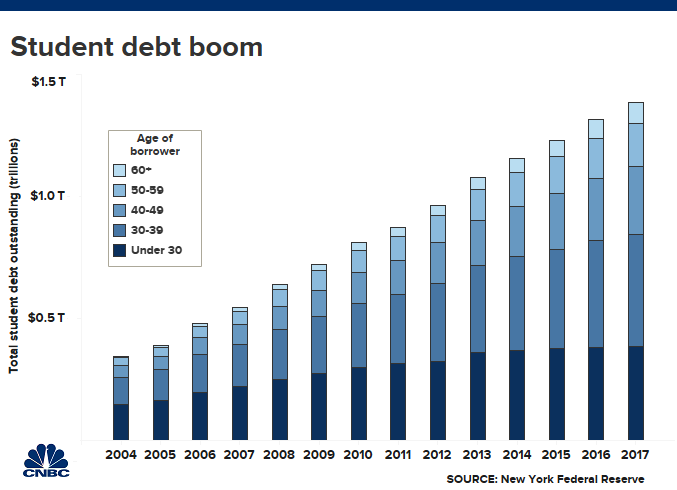Like many students his age, Natanael Pabon-Trinidad, 18, wanted to pursue a college degree. He simply didn’t have the funds to afford it.
“My mom doesn’t have a high-paying job, and I was worried about all that and not being able to pay,” he said.
Rather than relying on loans, Pabon-Trinidad was encouraged by his high school teachers to try a different route.
With their help, he piled on College Level Examination Program, or CLEP, courses ahead of graduation.
Taking CLEP classes in high school — and scoring a passing grade on the official exams at the end of each course — can earn students credit hours once they are in college. And shaving a semester or two off the total time spent as an undergraduate is a good way to graduate with less debt.
Unlike Advanced Placement, another program in which high school students take courses and exams that could earn them college credit, CLEP classes can be taken by anyone at any time. They are not restricted to high school students on a specific — and often accelerated — academic track, as many AP classes are.
Yet CLEP courses have been under the radar for half a century.
More from Personal Finance:
Why college tuition keeps rising
Forget SATs, colleges want to know if you are a good person
Tuition-free college is now a reality in nearly 20 states
Thomas Jefferson High School in Gretna, Louisiana, where Pabon-Trinidad graduated last year, is trying to put CLEP on the map.
Thomas Jefferson is a Title I school, which means there is a high percentage of low-income students. Still, more than 95% of its graduates go on to college.
“These students have everything they need,” said Andrew Vincent, the principal of Thomas Jefferson. “The only thing that these students may not have is enough money for a four-year degree.”
Thomas Jefferson High School
Source: Thomas Jefferson High School
As a pilot program, Thomas Jefferson partnered with Modern States Education Alliance, a New York-based nonprofit dedicated to making a college education more affordable.
Modern States provided access to more than 40 core college freshman subjects, from Spanish to American History, as well as the accompanying text books and exam vouchers, all at no cost.
“I felt strongly that we have the students that are capable of going to college and being successful, but we also have students that need a leg up,” Vincent said.
“This is an on-ramp into college,” said Steve Klinsky, founder and CEO of Modern States. Klinsky also serves as chairman of the advisory board to Harvard’s program for education policy and governance.
This is an on-ramp into college.
Steve Klinsky
founder and CEO of Modern States
In the first year of the partnership with Modern States, students at Thomas Jefferson took a total of nine CLEP tests. As of last year — just three years since the program’s start – that number jumped to 223.
Before launching the pilot program, “30% were graduating with College Board exam credits,” said Vincent. “Last year, it was 81%.
“I’d like to see that go to 100%,” he added.
For his part, Pabon-Trinidad took eight CLEP classes in high school and graduated with 26 credit hours altogether, or the equivalent of one year of college completed.
Now a freshman at Louisiana State University, he is the first person in his family to go to college.
“I should be able to finish my degree in 2½ to 3 years,” the political science major said — and with zero debt. (So far, Pabon-Trinidad’s college tab is fully covered by scholarship money.)
A science class at Thomas Jefferson High School
Source: Thomas Jefferson High School
Students who go to college with CLEP credit have a higher success rate than students who don’t, according to Vincent.
In fact, studies show that “taking college courses in high school can increase the chances that both advantaged and disadvantaged students go to college and earn a degree,” said Davis Jenkins, a senior research scholar at the Community College Research Center, or CCRC, and a co-author of a recent study on graduation rates.
In addition to the long-term benefits, taking CLEP classes is another way for students to demonstrate their ability to complete college-level coursework, according to Mark Kantrowitz, publisher of SavingForCollege.com. That can help them in the application process. “It can increase your chances of getting in,” he said.
However, CLEP classwork should not be undertaken to the exclusion of hobbies, sports or volunteer work, he added. “Colleges want depth rather than breadth.”
Of course, the potential savings may be the greatest asset.
A college education is now the second-largest expense an individual is likely to make in a lifetime — right after purchasing a home. Tuition and fees for a four-year private college averaged $35,830 in 2018-19; at four-year, in-state public colleges, it was $10,230, according to the College Board. And that’s not including room and board or other expenses.

These days, only about 10% of families pay for the entire cost out of pocket, while everyone else is either borrowing or using a combination of resources, according to Marie O’Malley, senior director of consumer research at Sallie Mae.
As many of the Democratic presidential candidates detail plans to address what is increasingly called a student loan crisis, CLEP exams are one way to potentially avoid college debt altogether.
“It is so attractive to students and parents to shave down the college expense,” said Robert Franek, The Princeton Review’s editor-in-chief. But before committing, be sure to check the requirements for each college and see if the credits will apply. (That information is often available on a college’s web site.)
It is important to be critical at the outset, Franek said. “Don’t assume they are going to count for college credit.”
There are currently about 2,900 schools that accept CLEP credit, including many state schools and community colleges.
